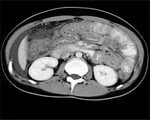A bout of gastroenteritis or diarrhoeal disease caused by the bacteria - Salmonella or Campylobacter, increases the odds that a person will develop inflammatory bowel disease.

Inflammatory bowel disease, or IBD, refers to a group of conditions, including Crohn's disease and ulcerative colitis, marked by chronic inflammation in the intestines, leading to symptoms like abdominal pain and diarrhoea.
Researchers compared the risks of IBD between 13,148 patients with documented gastroenteritis caused by Salmonella or Campylobacter and 26,216 uninfected controls in Denmark. Over the course of 7.5 years, IBD was diagnosed for the first time in far more gastroenteritis patients (107 or 1.2%) than healthy control subjects (73 or 0.5%), it was found.
The increased risk of IBD linked to gastroenteritis by these bacteria was highest during the first year. After accounting for a variety of factors that might influence the risk, these gastroenteritis patients had nearly a threefold increased risk of developing IBD over the entire study period, and nearly a twofold increased risk in the first year after infection.
The risk of IBD was more than fivefold higher for patients hospitalised within days before or after the episode of gastroenteritis. The increased risk of IBD after the gastroenteritis episode persisted throughout the 15-year observation period and was similar for Salmonella and Campylobacter and for a first-time diagnosis of Crohn's disease and ulcerative colitis.
DoctorNDTV is the one stop site for all your health needs providing the most credible health information, health news and tips with expert advice on healthy living, diet plans, informative videos etc. You can get the most relevant and accurate info you need about health problems like diabetes, cancer, pregnancy, HIV and AIDS, weight loss and many other lifestyle diseases. We have a panel of over 350 experts who help us develop content by giving their valuable inputs and bringing to us the latest in the world of healthcare.












